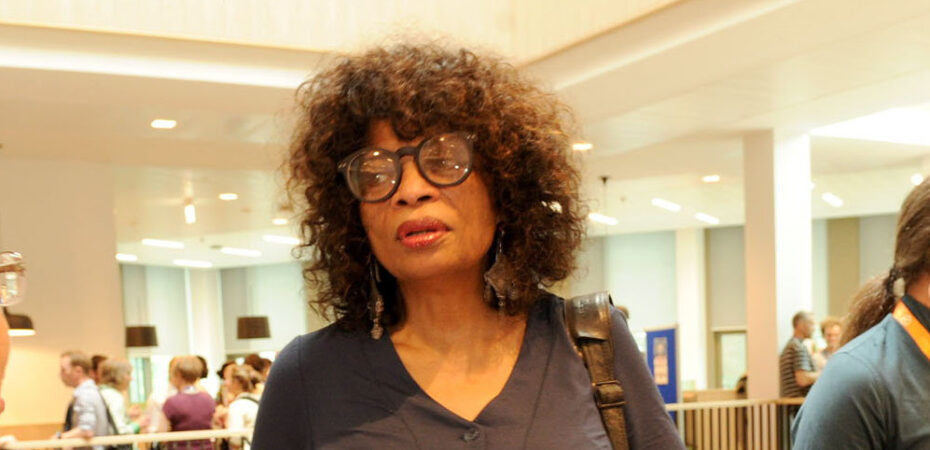
In this post, Barbara Becnel, keynote speaker at the Learning and Teaching 2023 Conference, answers delegates’ questions posed at the end of her presentation: ‘The challenge of reimagining education: Getting unstuck from academic traditions to construct new concepts regarding knowledge production and classroom practice’. In her talk, Barbara draws on the notion of ‘reimagining’, using compelling comparisons between black youth gangs of California’s Crips and Bloods, and the traditional structures of academia and scholarship. This post is part of the July-August Learning & Teaching Enhancement theme: Learning and Teaching Conference 2023↗️.
On 28 June 2023, I gave a keynote presentation about the challenges of reimagining the scholarship and practice of education, mostly because such an undertaking involves first reimagining oneself.
Given that premise, I suggested that scholars and educators begin this reimaginative journey by examining their own intellectual and social biases, and by creating a reflexivity plan to transcend such biases. I also introduced the strategy of pretending not to have been trained in the discipline of education to enable a view of the strengths and weaknesses of the discipline from a different perspective. I offered a couple of techniques for getting unstuck from scholarly tradition, including the tactic of connecting the unexpected to the unexpected when developing an analysis, and framing a research project by figuring out what you do not know, rather than framing research to reinforce what you believe you already know.
With that context, below are my answers to the excellent follow-up questions from the audience (in bold, and anonymised) provoked by this presentation.
I’d be interested to know how you’d approach the issue that sometimes theory is difficult, but that doesn’t mean that grappling with it shouldn’t be encouraged. How do we encourage students to have confidence, but also to be able to sit with discomfort as they move towards understanding?
Once I learned how to get a handle on what to do with theory, even very abstract theory became a fun and interesting opportunity to deconstruct and make useful. As cultural theorist Stuart Hall stated, theory is best when it derives from the concrete example, that is, from real-word phenomena. So, my reverse of Stuart Hall’s brilliant advice to students is to examine theory from the vantage point of how it can be applied to the concrete. That is, to the issues of interest to the students examining that theory. What that does is to transfer ownership of sorts of someone else’s theory and ideas to the students because they become immediately involved in seeing how the theory works, practically, on subject matter that has some significance for them. I also encourage students to slice theory up into absorbable pieces to decide which parts of a theory at hand resonate as useful for the students’ issues and concerns, as well as to discern which parts are not so useful and to make arguments for both sides of those theory-using or theory-rejecting options. My experience has been that when students take ownership of theory, their understanding of theory is not nearly as discomforting—if discomforting at all.
You can hear more about how to ‘Make Theory Work for You’ on my podcast episode, with Dr Callum McGregor:
[I am] very interested in your comments on academic writing being so non-committal. I know exactly what you mean, but as I work with students to help them develop academic writing skills, I wonder what the implications are of teaching students to challenge these norms. Might it not do them a disservice as they won’t meet expectations and may have poor assessment outcomes?
My primary argument against academic writing is that it too often works against clarity! The purpose of knowledge production is to situate a new understanding of social experience, of history, of science, in a broader environment. But that work, I argue, must first be understood – and by more than just scholars. Public policymakers, for example, would do well to be able to readily comprehend theorising and conceptualising.
My strategy, then, to attain academic acceptance of straightforward academic discourse is twofold. Firstly, I comply (for the most part 😊) with the traditional structure for academic papers, but my prose reflects a clear, lucid style. Secondly, I write positionality sections near the beginning of my articles to offer transparency regarding my decolonial, ethical practices involving non-traditional academic writing. These are techniques that have worked for me across multiple disciplines, including education, law, ethnographic methodology, and ecclesiastical history.
As a Black American person, how has your experience been getting used to Scottish academia? Did you feel welcomed? Did you run into big cultural differences? What advice would you give to overcome ‘imposter syndrome’ to be a true renegade?
As a black American, acclimatising to Scottish academia has been interesting. I felt welcomed, but, in the beginning, I did not always feel that I was believed by Scottish academia when I discussed the brutal reality of racism in the United States. The typical response was: How could any of these things be true?
This attitude was prevalent prior to the George Floyd racist incident in the US. However, after that horrid event, I did feel a shift in Scottish academia about the probability of racism in the United States. But that shift in attitude also included some surprise that there was such a supportive response in Scotland, the UK, and elsewhere, to the George Floyd murder by a police officer. There appeared to be an underlying assumption that Scotland did not suffer such racism as was on display in the US. Which leads me to another fascinating cultural difference among too many Scottish scholars: a belief that the UK has had far less involvement in what happened in colonial America regarding slavery and racism than is historically factual. The slave codes, for instance, originated in the British slave society of Barbados and, from there, spread to the American colonies.
Regarding the transcendence of an imposter syndrome, becoming a true renegade involves a great deal of courage to challenge entrenched academic traditions and Euro-centric standards for scholarship. My argument, therefore, is that the decision to evolve into a renegade scholar, renegade teacher, or renegade student is the antithesis of experiencing the imposter syndrome and would therefore help to overcome such an affliction.
I love this idea of connecting the unexpected to the unexpected. Do you think that all such connections are valuable (because they shake things up)? Is there such a thing as a bad connection, and how do we tell?
This question provides a great hint as to the value of succeeding or failing via the use of a research technique that attempts to connect the unexpected to the unexpected. First, such an effort is well worth it because the process alone of sorting through unexpected connections teaches a scholar so much about the issue under examination. The new knowledge can lead to new and thus unexpected avenues of knowledge that enrich a scholar’s understanding, and even lead to an epistemic shift in how the scholar views his or her research project.
I know when my connection is ‘bad’ because at some point I hit a wall where every analytic turn that I take refuses to reveal a way to sum-up my critique and provide an avenue to move forward with the work. This circumstance is always my clue that it is time to find another connection.
Do you think there’s anything we can learn about education and learning from the American black gangster class?
Yes. We can learn a great deal from the black gangster class about the reconceptualisation process, as well as what can be achieved by the reimagination of self and society, particularly the challenging society that street gangsters must figure out how to navigate.
To illustrate, I have learned from my long-term immersive ethnographic research project (about nineteen years) with California’s Crips and Bloods black youth gangs that these street gangsters have mastered the ability to reimagine themselves, as well as reimagine harsh aspects of the urban and carceral environments in which they reside. For them, the process of reimagination allows the gangsters to construct through reconceptualisation a culturally-elevating situation that turns on its head a mass incarceration policy intended for black men and other men of colour in the United States.
To do this, black gangsters have reimagined prison into what they define as a ‘gladiator school’. Prison as gladiator school is a place to learn how to become a man by daily surviving its violence; its life-or-death conditions. Becoming a man by becoming an expert on how not to get killed – and to kill when need be – serves as a reputational elevation in what I have labeled their ‘culture of the condemned’. This is how they exert agency, or ‘inventive agency’ (another of my titles), over their own lives, since they cannot do away with mass incarceration policy.
The black gangster class has reimagined a whole new social structure within a mainstream societal structure that has targeted them for, among many things, banishment as punishment. Some of what is applicable to education and learning, then, is how we reimagine.
I think the black-gangster process of reimagination, of reconceptualisation, can be studied by educators to glean insights for reimagining longer-term strategies to enact structural change, initially working within existing educational structures, as well as shorter-term strategies for more renegade reimagining of new paradigms of educational scholarship and actual practice.
You can watch Barbara’s keynote talk, ‘The Challenge of Reimagining Education: Getting Unstuck from Academic Traditions to Construct New Concepts Regarding Knowledge Production and Classroom Practice‘, in the video below:
 Barbara Becnel
Barbara Becnel
PhD candidate, social justice activist, and author Barbara Becnel has more than twenty years of experience working for prison reform in the state of California, while writing nine award-winning, non-fiction books on street gang culture, as well as over one-hundred journal, magazine, and newspaper articles. Building on her MSc in Social Justice and Community Action earned from The University of Edinburgh, Barbara returned there to pursue a PhD. Her thesis explores how death row became a symbol of heroism for America’s street-gang generation. Integral to this is her collaboration with three former-though-imprisoned South Central Los Angeles gang members who are co-researchers on the project.


